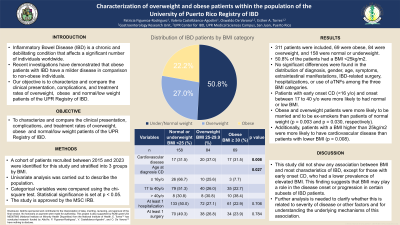Monday Poster Session
Category: IBD
P2165 - Characterization of Overweight and Obese Patients Within the Population of the University of Puerto Rico Registry of IBD
Monday, October 23, 2023
10:30 AM - 4:15 PM PT
Location: Exhibit Hall

Has Audio
- PF
Patricia Figueroa Rodríguez, MSc(Epi)
University of Puerto Rico Medical Sciences Campus
San Juan, Puerto Rico
Presenting Author(s)
Patricia Figueroa Rodríguez, MSc(Epi), Valeria Castelblanco Agostini, BS, Oswaldo De Varona Vega, MD, Esther A. Torres, MD, MACG
University of Puerto Rico Medical Sciences Campus, San Juan, Puerto Rico
Introduction: Recent investigations have demonstrated that obese patients with Inflammatory Bowel Disease (IBD) have a milder disease in comparison to non-obese individuals, but. a comprehensive understanding of the impact of obesity on IBD is lacking. Our objective is to characterize and compare the clinical presentation, complications, and treatment rates of overweight, obese and normal/low weight patients of the UPR Registry of IBD.
Methods: The UPR Registry of IBD is a medical database that has been actively recruiting participants since 1995.A cohort of patients recruited between 2015 and 2023 were identified for this study and stratified into 3 groups by BMI: normal/low, overweight and obese. Univariate analysis was carried out to describe the population according to sociodemographic, clinical, and IBD related characteristics. Categorical variables were compared using the chi-square test. Statistical significance is set at p < 0.05. The study is approved by the MSC-IRB.
Results: Of the 311 patients included, 69 were obese, 84 were overweight, and 158 were normal or underweight. Approximately half of the patients with ulcerative colitis (UC) and Crohn’s disease (CD) had a BMI < 25kg/m2. No significant differences were found in the distribution of diagnosis, gender, age, symptoms, extraintestinal manifestations, IBD-related surgery, hospitalizations, or use of aTNFs among the three BMI categories. However, those with early onset CD (< 16 y/o) had normal or low BMI more frequently. Marital status and tobacco use were significantly different among the BMI categories (p = 0.003 and p = 0.030, respectively). Obese and overweight patients were more likely to be married and to be ex-smokers than patients of normal weight. Additionally, patients with a BMI higher than 25kg/m2 were more likely to have cardiovascular disease than patients with lower BMI (p = 0.008).
Discussion: This study did not show any association between BMI and most characteristics of IBD, except for those with early onset CD, who had a lower prevalence of elevated BMI. Further analysis is needed to clarify whether this is related to severity of disease or other factors. Not surprisingly, cardiovascular disease was associated with high BMI, an association already described in the non-IBD population. More studies are needed to explore further the impact of BMI and specifically obesity on the evolution and treatment of IBD.
Disclosures:
Patricia Figueroa Rodríguez, MSc(Epi), Valeria Castelblanco Agostini, BS, Oswaldo De Varona Vega, MD, Esther A. Torres, MD, MACG. P2165 - Characterization of Overweight and Obese Patients Within the Population of the University of Puerto Rico Registry of IBD, ACG 2023 Annual Scientific Meeting Abstracts. Vancouver, BC, Canada: American College of Gastroenterology.
University of Puerto Rico Medical Sciences Campus, San Juan, Puerto Rico
Introduction: Recent investigations have demonstrated that obese patients with Inflammatory Bowel Disease (IBD) have a milder disease in comparison to non-obese individuals, but. a comprehensive understanding of the impact of obesity on IBD is lacking. Our objective is to characterize and compare the clinical presentation, complications, and treatment rates of overweight, obese and normal/low weight patients of the UPR Registry of IBD.
Methods: The UPR Registry of IBD is a medical database that has been actively recruiting participants since 1995.A cohort of patients recruited between 2015 and 2023 were identified for this study and stratified into 3 groups by BMI: normal/low, overweight and obese. Univariate analysis was carried out to describe the population according to sociodemographic, clinical, and IBD related characteristics. Categorical variables were compared using the chi-square test. Statistical significance is set at p < 0.05. The study is approved by the MSC-IRB.
Results: Of the 311 patients included, 69 were obese, 84 were overweight, and 158 were normal or underweight. Approximately half of the patients with ulcerative colitis (UC) and Crohn’s disease (CD) had a BMI < 25kg/m2. No significant differences were found in the distribution of diagnosis, gender, age, symptoms, extraintestinal manifestations, IBD-related surgery, hospitalizations, or use of aTNFs among the three BMI categories. However, those with early onset CD (< 16 y/o) had normal or low BMI more frequently. Marital status and tobacco use were significantly different among the BMI categories (p = 0.003 and p = 0.030, respectively). Obese and overweight patients were more likely to be married and to be ex-smokers than patients of normal weight. Additionally, patients with a BMI higher than 25kg/m2 were more likely to have cardiovascular disease than patients with lower BMI (p = 0.008).
Discussion: This study did not show any association between BMI and most characteristics of IBD, except for those with early onset CD, who had a lower prevalence of elevated BMI. Further analysis is needed to clarify whether this is related to severity of disease or other factors. Not surprisingly, cardiovascular disease was associated with high BMI, an association already described in the non-IBD population. More studies are needed to explore further the impact of BMI and specifically obesity on the evolution and treatment of IBD.
Disclosures:
Patricia Figueroa Rodríguez indicated no relevant financial relationships.
Valeria Castelblanco Agostini indicated no relevant financial relationships.
Oswaldo De Varona Vega indicated no relevant financial relationships.
Esther A. Torres: AbbVie – Grant/Research Support. Bristol Myers Squibb – Grant/Research Support. Sanofi – Grant/Research Support.
Patricia Figueroa Rodríguez, MSc(Epi), Valeria Castelblanco Agostini, BS, Oswaldo De Varona Vega, MD, Esther A. Torres, MD, MACG. P2165 - Characterization of Overweight and Obese Patients Within the Population of the University of Puerto Rico Registry of IBD, ACG 2023 Annual Scientific Meeting Abstracts. Vancouver, BC, Canada: American College of Gastroenterology.
